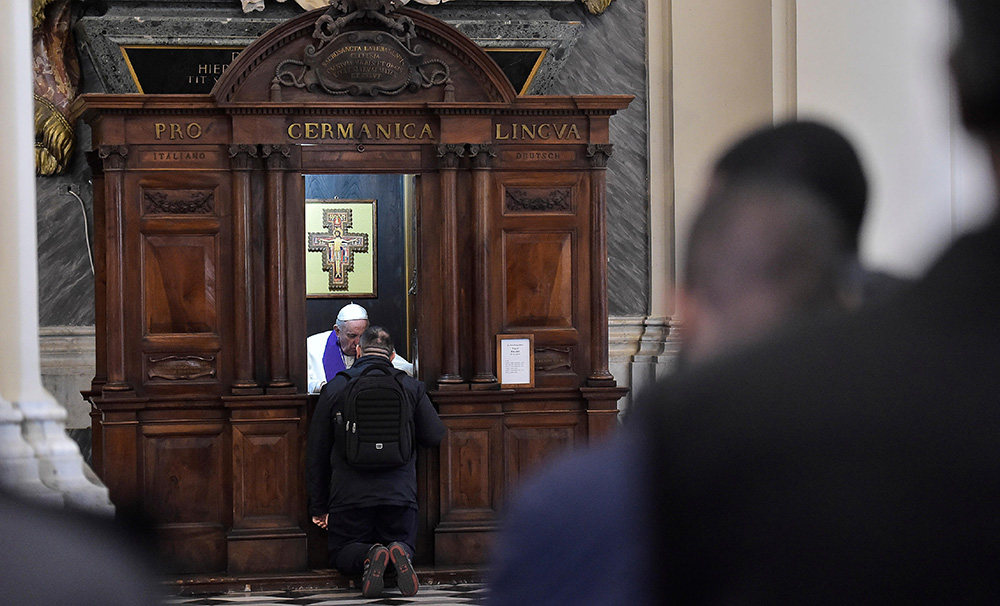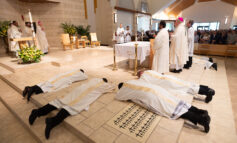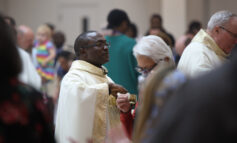
Pope Francis hears the confession of a priest March 7, 2019, at Rome’s Basilica of St. John Lateran. The pope administered the sacrament to several priests during his annual Lenten meeting with the priests of the Diocese of Rome. (CNS photo/Vatican Media)
By Father Jacob Dankasa
Special to The Texas Catholic
One of the hardest virtues to practice is forgiveness. It’s even more difficult when we consider the different degrees of hurt and pain we have to endure when we are offended. The difficulty in forgiveness arises mostly because of human anger and resentment, which are often long-lasting in the human mind. These lingering feelings of anger and resentment make it harder to forgive.
Jonah Paquette, the author of Real Happiness, defines forgiveness as the “conscious effort to let go of anger and resentment towards a person or a group who has harmed you. It means liberating ourselves from motivations for revenge or avoidance, regardless of whether or not the other person may deserve it.” Forgiveness is hard because most of the time we think of it as doing a favor to the offender when we forgive. Consequently, when the offender does not come forward to seek forgiveness, we hold onto anger and resentment.
Anger and resentment are the prisons that cage our hearts and minds. When we hold on to anger and resentment, we are locked in the prison of emotional distress that ignites our desire for revenge and vengeance. This only hurts our emotional state more. And such an emotional state can negatively impact our physical wellbeing. Nelson Mandela stated, “Resentment is like drinking poison and then hoping it will kill your enemies.” If we don’t forgive, we’ll remain in our prison of emotional trauma while those who hurt us are living normal lives. But when we forgive, we set our hearts and minds free.
I am not naive to the pain and hurt that some people have to endure as a result of offenses committed against them. As a priest, I have heard stories from people who have narrated ills committed against them by spouses, friends or others. Some of the stories and the immensity of the hurt inflicted are so grievous that sometimes it’s really hard for me to simply tell the person to forgive. But after all is said and done, the only path to emotional well-being seems to be the hardest path — forgiveness. Like many virtues, forgiveness needs to be learned and practiced, and it is a process of healing that occurs gradually in the human heart and mind.
Forgiveness will not suddenly take away the severity of the pain caused to you. It may not quickly fix the problem; it may not necessarily lead to reconciliation, or even make you forget the pain. But it may help free you from the prison in which the quest for revenge or vengeance places you. This is a prison that incarcerates your heart and mind with anger and resentment which can further worsen your emotional trauma. Again, forgiveness is not about the other person — it’s about you. When Nelson Mandela was released from prison, he recognized the need to release his heart and mind from another type of prison — an emotionally self-inflicted prison that he would have put himself in if he had nurtured anger and resentment against those who took away almost three decades of his life. With his newly found influence, he could have used that anger to punish his jailers, but he consciously chose a different path. He stated, “As I walked out the door toward the gate that would lead to my freedom, I knew if I didn’t leave my bitterness and hatred behind, I’d still be in prison.” He didn’t want to be physically free, yet emotionally imprisoned, due to the desire for revenge and vengeance.
Forgiveness is hard, but it is “doable” because it can be practiced and learned. Forgiveness heals the offended even more than the offender, who may not even be aware that he has been forgiven. Forgiveness is freedom from emotional trauma, from bitterness, from anger and from resentment. And as Lewis B. Smedes cited: “to forgive is to set a prisoner free and discover the prisoner was you.”
Father Jacob Dankasa is a parochial vicar at St. Elizabeth Ann Seton Catholic Church in Plano.



